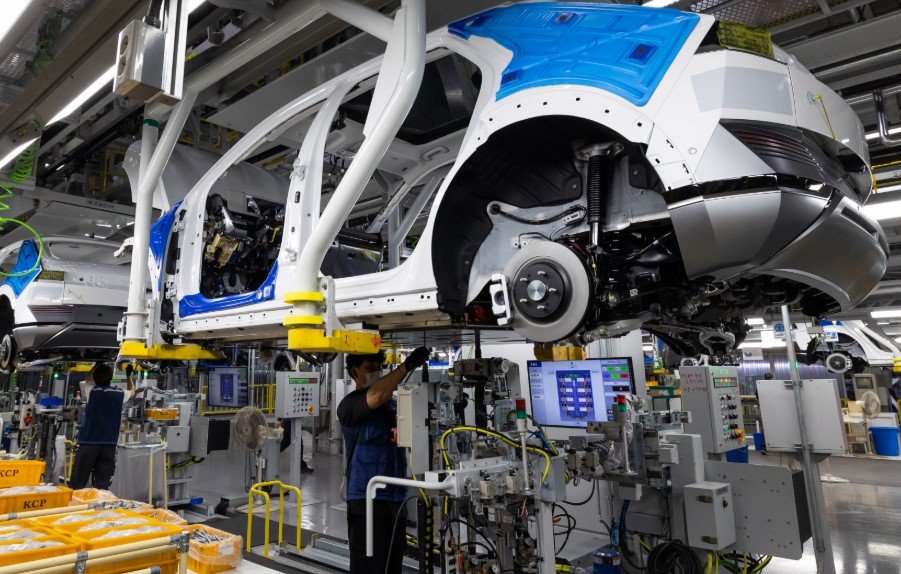The largest U.S. immigration raid in two decades has left hundreds of families in Georgia scrambling for answers, support, and stability.
Phones That Don’t Stop Ringing
When federal agents stormed Hyundai’s sprawling manufacturing site in southeast Georgia on Sept. 4, the ripple effect spread far beyond the factory floor. Nearly 500 workers were detained in a single morning. Since then, social workers and nonprofit groups say their phones have been buzzing constantly with cries for help.
Rosie Harrison, who leads a small nonprofit called the Grow Initiative, described the chaos bluntly. “Families are experiencing a new level of crisis,” she said, adding that her team is overwhelmed but unwilling to turn anyone away.
For many, the raid didn’t just remove breadwinners from households. It broke routines, pulled children out of classrooms, and left entire neighborhoods wondering who might disappear next.
Who Was Taken, Who Was Sent Back
Of the 475 people detained, federal officials said the majority were Korean nationals. Many of them have already been deported or returned voluntarily to South Korea. But the situation isn’t as clear for others.

Non-Korean workers, including those from Mexico, Guatemala, Venezuela, Chile, Colombia, and Ecuador, are stuck in legal limbo. Some remain in detention facilities, while others haven’t been located at all. “We have families who simply don’t know where their loved one is,” said Vanessa Contreras of Migrant Equity Southeast.
Her organization has just 15 staffers. Yet, within hours of the raid, they were fielding dozens of frantic calls, trying to connect people with lawyers, translators, and temporary housing. One volunteer described it as “trying to stop a flood with a bucket.”
Children Caught in the Middle
For schools in the area, the raid hit like a thunderclap. Teachers reported that children showed up crying or refused to speak altogether. One counselor said she spent her entire day just sitting quietly with a fourth grader whose father was taken away.
The county’s social services office has scrambled to track which children suddenly need foster care, food stamps, or emergency guardianship. But the pace of the crisis has outstripped their resources.
Some households are now relying on neighbors to keep kids fed and safe. “It’s community holding community,” Harrison explained. “We’ve had mothers asking strangers on the bus to help pick their kids up from school because they don’t know if they’ll be home in time.”
Local Economy Under Strain
The Hyundai plant isn’t just a workplace; it’s a cornerstone of the region’s economy. Losing hundreds of workers overnight has disrupted production schedules and sparked fears of layoffs for others not directly targeted in the raid.
Here’s what’s at stake for the region:
-
Hyundai’s plant employs about 4,500 workers, both permanent and temporary.
-
Roughly 1 in 5 workers detained were involved in core assembly tasks.
-
Suppliers in nearby towns depend on consistent factory output, meaning delays ripple through trucking, parts manufacturing, and even local diners that serve shift workers.
One small café owner near the plant said breakfast sales plummeted after Sept. 4. “We’d see lines of guys coming in before work. Now half those tables are empty,” she said.
Legal Maze and Uncertain Futures
Immigration attorneys describe the situation as unusually complicated. The Korean workers, many employed under contract, had relatively straightforward exit paths. But Latin American workers face a patchwork of visa statuses, asylum claims, and pending applications.
A table shared by Migrant Equity Southeast shows the breakdown of legal cases so far:
| Nationality | Approx. Detained | Current Status |
|---|---|---|
| South Korea | 290 | Mostly deported/returned |
| Mexico | 60 | Pending legal hearings |
| Guatemala | 35 | Some detained, some missing |
| Venezuela | 25 | Seeking asylum |
| Colombia | 20 | Legal limbo |
| Others (Chile, Ecuador) | 45 | Mixed outcomes |
Contreras noted that for many, court dates are months away, leaving families in a state of prolonged uncertainty. Some who were released on bond can’t legally work, but still need to pay rent and feed children.
Politics and Public Backlash
The raid has quickly become a flashpoint in Georgia politics. Local officials are split. Some praised the federal sweep as necessary to “restore order” in the labor market. Others argued it tore apart communities and punished workers more than the corporations that hired them.
Protests have already erupted in Atlanta and Savannah, where immigrant rights groups marched with signs reading “Families Belong Together” and “Stop Raids, Start Reform.”
Meanwhile, Hyundai has issued a brief statement emphasizing its compliance with U.S. labor laws, but stopped short of addressing how the raid affects its operations. That silence has angered both labor advocates and local families. “They can replace machines, but you can’t replace a father,” said one worker’s spouse at a rally.
The Human Cost Lingers
Behind the statistics and political arguments, what remains are fractured households and unanswered questions. Mothers are piecing together childcare schedules. Kids are waiting for phone calls that might not come. Whole communities are bracing for more raids.
No one seems to know how long this disruption will last. But as Harrison put it, “The damage is already done. These families are living with fear every single day.”
